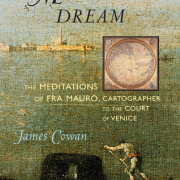Best read with a red … or maybe not
Review: A Mapmaker’s Dream
by James Cowan
Fra Mauro is a 16th century monk on a magnificent journey around the world without leaving the clustered confines of his cell on an island in Venice.
A cartographer devoted to drafting a definitive map of the world, he gathers his knowledge from a steady stream of travellers beating a path to his door.
Pilgrims merchants, explorers, scholars, foreign legates, ambassadors, missionaries, officers – all have heard of his ambition and want to make a contribution.
This, of course, presents Fra Mauro with a brilliantly seductive menagerie of Renaissance curiosities.
His visitors present him with cannibals and shrunken heads, turbaned Orientals, mermaids and hairy-bodied women, Borneo jungle dwellers who treat birdcalls as omens.
Together they discuss the world frequented by the thoughts and presence of Ptolemy, Solomon and Columbus, Babylon, Egypt and Rhodes, jade elixirs, Satan-worshippers, salamanders and one- legged men who wheel along on arms protruding from their chests.
Genghis Khan, Prester John, the Tartars, Crusaders, Persians, Thomas the Apostle in India – exotic characters are freely peppered throughout his cerebral discourses and peregrinations.
The problem Fra Mauro faces, however, the more he is confronted with tales that challenge the physical and philosophical tenets of his already considerable knowledge is to represent not the world’s geography but its thoughts and mysteries.
What he is trying to do is depict in two dimensions, within the margins of his maps, the three dimensions of space – a difficult task in pre-Mercator days .
He wants to incorporate the multi-layered dimensions of humour, thought, experience and philosophy as well.
Author Cowan uses phantasmagorical elements of the Renaissance as metaphor and playground for the discovery of the mind.
The experience is other-worldly. The intent seems to be to disarm the reader’s sensibilities and then usurp his beliefs – just as Golden Age discoveries of that time turned the world on its head.
Cowan has some tips for the reader. He says to treat Fra Mauro’s ruminations as a process of gradual guessing. His dream is to derive meanings from the perfect use of mystery.
And there is something of a rider, too. It is for the reader, says Cowan, to decide if Mauro’s meditations on the discovery of the world strike a sympathetic chord.
In many ways this is not difficult. For instance, a scholar, one of Fra Mauro’s visitors, finds himself inexplicably captivated by the mummified corpse of an ancient Egyptian princess.
Her death repose suggested to him that even in death her life had provided a jolt. “We do not engage in life so easily. It is not something we embrace naturally … in a sense we need to be jolted into it, do we not? he asks Fra Mauro.
An elderly Jew from Rhodes, perturbed by his homeland’s trials, has lived in self-imposed exile for many years. These twin seeds of defeat – his Jewishness and exile – prompted him to embrace his solitude.
Says Mauro: “He had discovered in his ruthlessness how to inhabit origin of his own mind … to redeem himself rather than allow another to do so for him.”
Cowan writes of deceptive appearances, of interpretation, of discernment and of searching. His vehicle, the immovable Fra Mauro, is yet another of many symbols.
And while it might seem self-promotion on Cowan’s part, you are left with the feeling he is correct when he says one feels that Fra Mauro has something important to say not just for his time but for always.
A word of advice. One critic suggested A Mapmaker’s Dream should not be read without red wine. Perhaps not, but I suspect a clear head would be far preferable.
This book shakes and bounces. It spins the world like a top and rocks its foundations as it negotiates a bewitching path through history, religion and philosophy.
And you wouldn’t want to miss anything on a ride ride like this.

